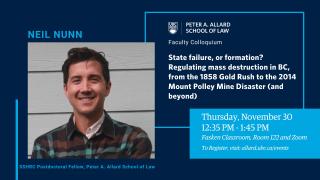Description of Event
Amidst a growing awareness of existential ecological threats and histories of genocide, why has the colonial state of British Columbia (BC) proven incapable of averting further large-scale and widespread social and ecological death? This paper seeks insight into this question by placing the 2014 Mount Polley Mine disaster—the largest mine-waste disaster in Canadian history—within a broader settler-colonial context in BC. I argue that turning to BC’s settler-colonial history offers valuable clues into an inability of colonial modern governance to respond to ecocide and mass racialized death and disruption. BC's history reveals a delicate dance of colonial governance whereby, on the one hand, the colonial government offers primacy to violent forms of extractivism, while on the other, its sovereign power relies on maintaining beliefs from the body politic of safety and stability. I exemplify this tension between industrial primacy, and an appearance of responsible governance (amidst increasingly unignorable manifestations of ecological disruption) by examining the implementation of environmental laws leading to and following the disaster. This paper concludes with concrete suggestions about moving beyond this enduring and deadly settler-colonial politics of devastating.
Please contact Michelle Burchill for the Zoom link.
Speaker
- Allard School of Law
- Research
- All Students
- Faculty
- Staff
- Research Talks

